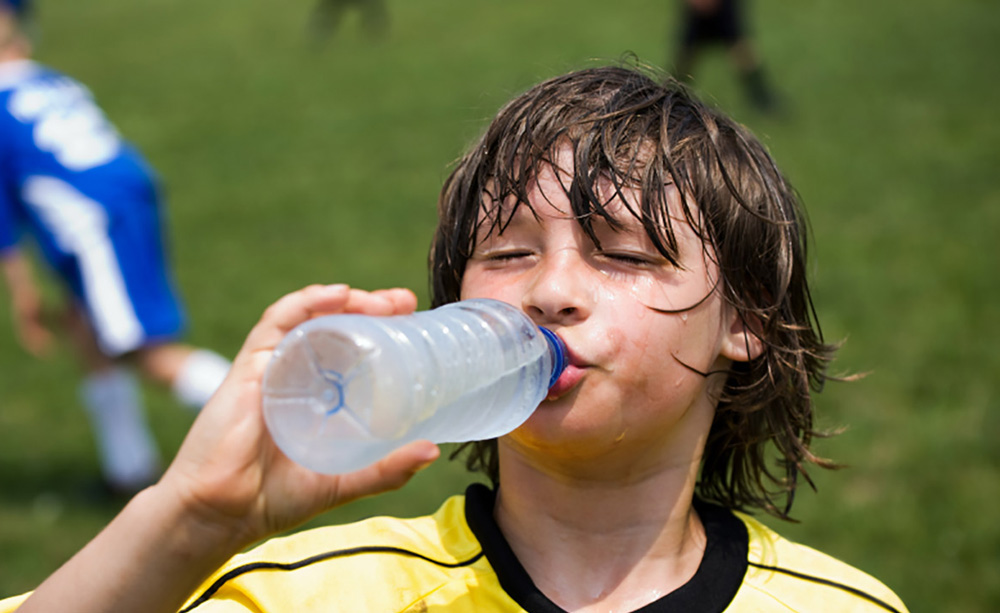With kids heading back to school, many of them will be hitting the gym and the field to practice their after-school sports. Sports teams provide an excellent way for children and teens to learn lifelong team building skills, but they also may require kids to be outside in the blistering South Florida heat for long periods of time. Excessive heat exposure, especially in high humidity, can create several types of heat-related illnesses, so it’s extremely important that parents and coaches are aware of the way that the temperatures are affecting young athletes. While temperatures are still high, look for these signs of heat illness in kids so that proper actions can be taken in the event that your child becomes sick due to the heat.
Types and Signs of Heat Illness in Kids
- Heat Cramps: Heat cramps are the least severe of any heat illnesses and occurs when the body is sweating a lot and losing fluids and salts. Muscle cramping most often happens in the legs, arms, or abdomen. This condition may not be deadly on its own, but it can be a sign of something more serious. If your child is suffering from heat cramps, it’s a good idea to find a cool place for them to rest and administer fluids such as sports drinks that have sugars and salts. Light stretching and massaging may also help the affected area.
- Heat Exhaustion: Heat exhaustion is a more serious condition that should be treated immediately. It can occur in a hot environment when someone is not drinking enough fluids to replenish the body. According to experts, symptoms of heat exhaustion in kids can include increased thirst, weakness, fainting, muscle cramps, nausea and/or vomiting, irritability, headache, increased sweating, cool, clammy skin and elevation of body temperature (but less than 104 °F). If you suspect that your child is suffering from heat exhaustion, find a cool area to let them rest and take off any excessive clothing. Give your child a sports drink and apply a cold cloth to their body. Call a medical professional if your child is too exhausted to drink or seems as though they may faint.
- Heatstroke: Heatstroke is the most severe heat-related illness and should be taken very seriously. If you feel like your child or someone you know is suffering from heatstroke, you should call a medical professional immediately. According to Kids Health, signs of heatstroke include the following: severe headache, weakness, dizziness, confusion, nausea, rapid breathing and heartbeat, loss of consciousness, seizure, no sweating, flushed, hot, dry skin, and temperature of 104 °F or higher. If heatstroke is suspected, once medical professionals have been called, it’s essential to get the child to a cool location and use cold water to cool down the body. Take off any excessive clothing and give the child fluids as long as he or she is responsive.
Here in South Florida, we may think that we are used to the heat, but it can still be a dangerous situation if your body becomes overheated. Children may not know that they are in danger, so it’s up to parents and supervisors to recognize the signs and symptoms and identify children at risk of overheating.
Heatstroke can be avoided if proper precautions are taken prior to children being outside in high temperatures. If your child has been out and about in the hot sun, it’s important to make sure they cool themselves down as soon as possible. If, after a while, they are still complaining about being too hot, it might be worth using the best thermometer that you have to check their temperature. If they are above the normal temperature, then they may have heatstroke or another heat-related illness. Be sure to follow some of these steps to prevent that. Adequate hydration is key so it is imperative that kids have access to sports drinks and water. Additionally, it’s a good idea to wear light and cool clothing when exercising outside and take frequent breaks to allow the body to cool off. Children should not exercise excessively in the midday heat.
At Panter, Panter, and Sampedro, we want every child in our community to be safe. We look forward to providing more safety tips for our community throughout the upcoming school year and invite you to visit our website at panterlaw.com for more tips.











 Deering Estate
Deering Estate
 Massage Envy South Miami
Massage Envy South Miami
 Calla Blow Dry
Calla Blow Dry
 My Derma Clinic
My Derma Clinic
 Sushi Maki
Sushi Maki
 Sports Grill
Sports Grill
 The Healthy Kitchen
The Healthy Kitchen
 Golden Rule Seafood
Golden Rule Seafood
 Malanga Cuban Café
Malanga Cuban Café

 Kathleen Ballard
Kathleen Ballard
 Panter, Panter & Sampedro
Panter, Panter & Sampedro
 Vintage Liquors
Vintage Liquors
 The Dog from Ipanema
The Dog from Ipanema
 Rubinstein Family Chiropractic
Rubinstein Family Chiropractic
 Your Pet’s Best
Your Pet’s Best
 Indigo Republic
Indigo Republic




 ATR Luxury Homes
ATR Luxury Homes


 2112 Design Studio
2112 Design Studio
 Hamilton Fox & Company
Hamilton Fox & Company
 Creative Design Services
Creative Design Services
 Best Pest Professionals
Best Pest Professionals
 HD Tree Services
HD Tree Services
 Trinity Air Conditioning Company
Trinity Air Conditioning Company
 Cisca Construction & Development
Cisca Construction & Development
 Mosquito Joe
Mosquito Joe
 Cutler Bay Solar Solutions
Cutler Bay Solar Solutions


 Miami Royal Ballet & Dance
Miami Royal Ballet & Dance
 Christopher Columbus
Christopher Columbus
 Pineview Preschools
Pineview Preschools
 Westminster
Westminster
 Carrollton
Carrollton
 Lil’ Jungle
Lil’ Jungle
 Frost Science Museum
Frost Science Museum
 Palmer Trinity School
Palmer Trinity School
 South Florida Music
South Florida Music
 Pinecrest Orthodontics
Pinecrest Orthodontics
 Dr. Bob Pediatric Dentist
Dr. Bob Pediatric Dentist
 d.pediatrics
d.pediatrics
 South Miami Women’s Health
South Miami Women’s Health

 The Spot Barbershop
The Spot Barbershop
 My Derma Clinic
My Derma Clinic




 Miami Dance Project
Miami Dance Project

 Rubinstein Family Chiropractic
Rubinstein Family Chiropractic
 Indigo Republic
Indigo Republic

 Safes Universe
Safes Universe
 Vintage Liquors
Vintage Liquors
 Evenings Delight
Evenings Delight





 Atchana’s Homegrown Thai
Atchana’s Homegrown Thai
 Baptist Health South Florida
Baptist Health South Florida

 Laser Eye Center of Miami
Laser Eye Center of Miami
 Visiting Angels
Visiting Angels
 OpusCare of South Florida
OpusCare of South Florida

 Your Pet’s Best
Your Pet’s Best





 HD Tree Services
HD Tree Services
 Hamilton Fox & Company
Hamilton Fox & Company


 Creative Design Services
Creative Design Services